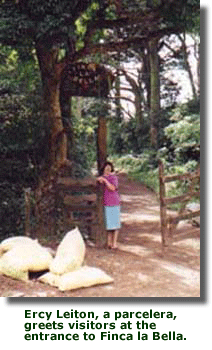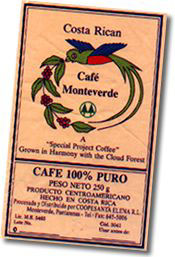


| QEW Presence at Gathering | Support for Other Quaker Gatherings | |||
|---|---|---|---|
| Finca la Bella | Outreach Programs |
|||
In her honor, Quaker Earthcare Witness members and other individuals contributed funds to purchase this 122-acre farm and continue to support this project, which is a blending of nature preservation, sustainable agriculture, and human services. A partnership made up of representatives from Quaker Earthcare Witness, Monteverde Friends Meeting, the Monteverde Institute, and the farmers' association, establishes policy and oversees management of the farm. The Santa Elena Cooperative, started in 1971 as a joint effort by the Quakers and Costa Ricans to provide needed services for the community, originally held title to the land, but recently the title was transferred to the Monteverde Institute. Successes FINCA LA BELLA has been busy over its short lifetime, inspiring all of us with a vision of an environmentally sustainable and peaceful world. Land for landless families. On these 122 acres, 24 previously landless families have 25-year renewable leases on two- to four-acre parcels. About a third of the farm is preserved in forest. Sustainable agriculture. Parcelero farmers use hand cultivation, have minimized or eliminated chemical use and have planted many windbreaks. Kindergarten for local pre-schoolers. As Ann Kriebel would have appreciated, a donor-supported community "kinder" for 4- to 6-year-olds, opened on La Bella in 1994, now prepares 15 to 20 children for 1st grade. Local health clinic. A two-room clinic, staffed by government employees and community volunteers two to three days a month, has been built on the farm. Farmers' association. Asociación Finca la Bella-Ana Kriebel was incorporated in 2000, and makes farm-level decisions. Agricultural exchanges. Between 1998 and 2000, eight parceleros and parceleras chosen by their community visited and worked on organic farms in the U.S. and Canada. Visitors from those countries also have gone to La Bella to work and learn. Ongoing education for farmers. Farmers have attended courses on organic agriculture, accounting and marketing, biodynamic agriculture, organizational dynamics, tourism, and guiding. Land trust. The parcelero association, Quaker Earthcare Witness, the Monteverde Institute, and the Costa Rican Environmental Law Foundation (CEDARENA, www.cedarena.org) are creating a land trust and conservation easement for La Bella, to provide a secure basis for the future of the farm. Community building. The families have constructed a timber frame community building using local renewable materials. Tree nursery. A grant-funded nursery produces native fast-growing tree varieties for windbreaks, fruit trees, and forest trees for birds like the quetzal. These seedlings are primarily for on-farm use, but some are sold for conservation projects. Challenges PROGRESS does not come without some struggle. Finca la Bella faces the following challenges: Legal fees. QEW and local institutions are working with CEDARENA and the Monteverde Institute to develop and monitor a land trust and easement to protect the farm and farmers, which will involve legal expenses. Capital for farmers. A credit union or revolving loan fund for farmers is needed to facilitate startup and infrastructure development. Nurturing leadership. QEW, the Monteverde Institute, and the parceleros agree that local leadership needs to be strengthened to bring the project to full maturity. While the challenges are not insignificant, the spirit is sturdy and commitment is strong!
COFFEE produced by Finca la Bella is sold as "Café Monteverde" through Montana Coffee Traders in the U.S. Many Meetings, churches, and individuals have purchased the coffee in five-pound bags at a discounted rate and sold the coffee in one-pound bags at full retail cost, sending the "profits" to the QEW office as a donation to the project.When you order the coffee, be sure to let Montana Coffee Traders know that you are raising money for Finca la Bella, so you get the discount. Also, be sure to order the one-pound paper bags, Café Monteverde coffee stickers, and decaf labels. Ask for a couple of articles that have appeared about the coffee. This will give you some background information as you sell the coffee. Call or write: Montana Coffee Traders Visitors welcome |

